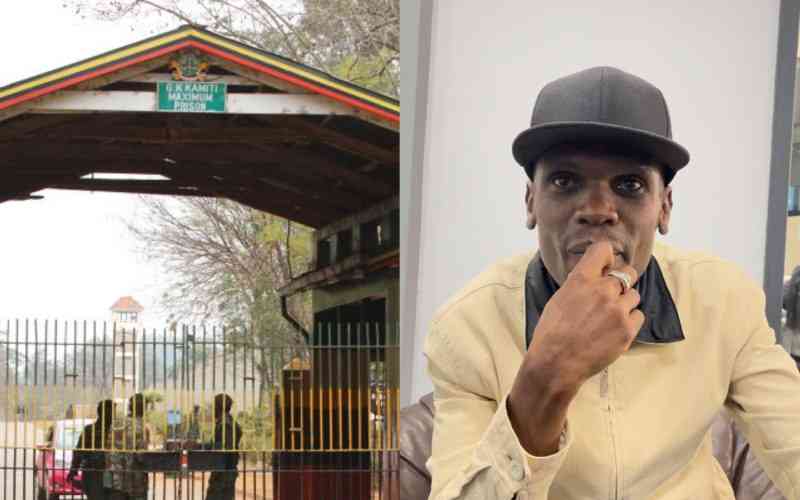
Did you know the death penalty still exists in Kenya? Think, for a moment, about a person sentenced to death. To most people, this happens in movies, safely enclosed in a world of fiction. However, this was the reality of one Alex Salamba, who was arrested on a robbery with violence charge sixteen years ago.
However, he walks free today, in a country that he hardly recognises; so far behind has it left him. He alone can tell a story of mercy and of being given chances many would argue someone with crimes like his should not be.
Alex was, by his admission, a hardened veteran of the crime world. Having done everything from carjacking to robbery with violence, no underworld trick could shock him. What started as a way to earn something extra under the brutal sun of Nairobi turned into his downfall one day in 1984 when he was arrested in a police shootout. He was tried for robbery with violence and promptly put on death row.
Death row Kenya's last execution of a prisoner was in 1987. But the country still hosts a death row population of nearly 600. Almost all were sentenced to death for murder or robbery with violence. New sentences are handed down every year.
Kenya is an "abolitionist de facto" state: the death penalty is still present in law and people are sentenced to death, but they aren't executed.
In Kenya, the death penalty was carried out by hanging, a relic from colonial times where that was the punishment for crimes from murder to treason. Currently, 17 of the African Union's 54 member states are abolitionists de facto - they have not executed a prisoner for at least 10 years. Just 11 are fully retentionist, meaning that they sentence people to death and have carried out executions.
In Kenya, according to research done by Oxford University, a quarter of those sentences are eventually reverted to life imprisonment by presidential pardon. Thus, Alex quite literally got his life back and was to serve time at Kamiti Maximum Prison.
Life imprisonment
According to Alex, life in prison is very monotonous. Once a new prisoner arrives, they are given a badge to mark them. They are also stationed in different blocks according to how long they have stayed. After six months, they 'graduate' and are given another badge.
"By the time an inmate has served four years and more, they become 'macho ya serikali'(eyes of the government)'. This means it is up to us to keep the newbies in line," he notes.
However, there is no shortage of activities for the inmates to do. After all, prison is supposed to be a reform system and Kamiti Maximum was no exception. There were various vocational courses offered, which included cooking, tailoring (Alex's specialty), and more. It is also possible to undertake the 8-4-4 system in prison. Most people have gotten their KCPE and KCSE certificates from behind bars.
None of these held a candle to freedom, something Alex said everyone takes for granted till they lose it. In Tanzania, day and night are counted as two separate days. This does not happen in Kenya, however. Every day they got less than half an hour of exercise time and that took a toll. In the bleakness of every day, however, he found God.
He took to theology like a fish to water and signed up for advanced theology classes. After passing them, he gained his accreditation and became a pastor, something he has held on to even outside of prison. Freedom The constitution, under the Penal Code, states that a robbery charge should serve 14 years. It also gives provision for inmates to appeal their cases where they feel the punishment given was too harsh. He tried to appeal to the High Court but due to the violent nature of his crime, his appeal was dismissed.
While the late President Kibaki was the reason his death sentence was reverted, President Uhuru came in clutch when he introduced resentencing. Resentencing was a process where an inmate could appeal to the lower court that convicted them; asking them to review the circumstances under which they were convicted. The inmate had to prove themselves rehabilitated enough to return to society. His appeal was successful and after fourteen long years, he saw the world outside prison. However, this process was rendered invalid by CJ Martha Koome.
Life after prison
When Alex got out of prison, his wife, allegedly terrified, ran away. This was news he received from one of his children. According to him, he is now in the market looking for a "mamaa"(wife). As he puts it, "It is because I married for beauty that she ran away. If I had married with character in mind. She would have stayed and waited for me with the children."
To the prisoners he left behind in Kamiti, his words are nothing but hopeful. "Life is only what you make of it, wherever you are," he muses. He encourages them to take advantage of the unlimited time they had to pursue their interests since being wards of the state meant their basic needs were already taken care of. "When you get out of jail, accept Jesus," he adds, not wasting a moment to stay true to his chosen profession.
 The Standard Group Plc is a multi-media organization with investments in media
platforms spanning newspaper print
operations, television, radio broadcasting, digital and online services. The
Standard Group is recognized as a
leading multi-media house in Kenya with a key influence in matters of national and
international interest.
The Standard Group Plc is a multi-media organization with investments in media
platforms spanning newspaper print
operations, television, radio broadcasting, digital and online services. The
Standard Group is recognized as a
leading multi-media house in Kenya with a key influence in matters of national and
international interest.
